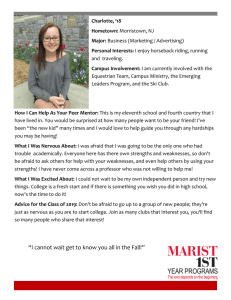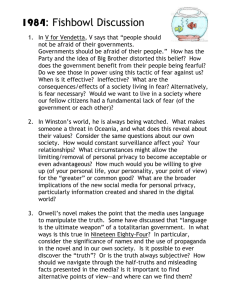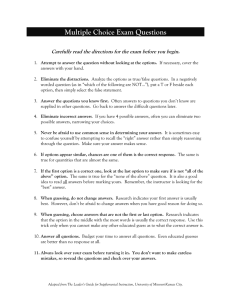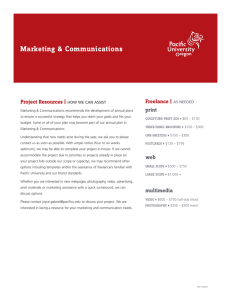Commencement Ceremony May 22, 2006
advertisement
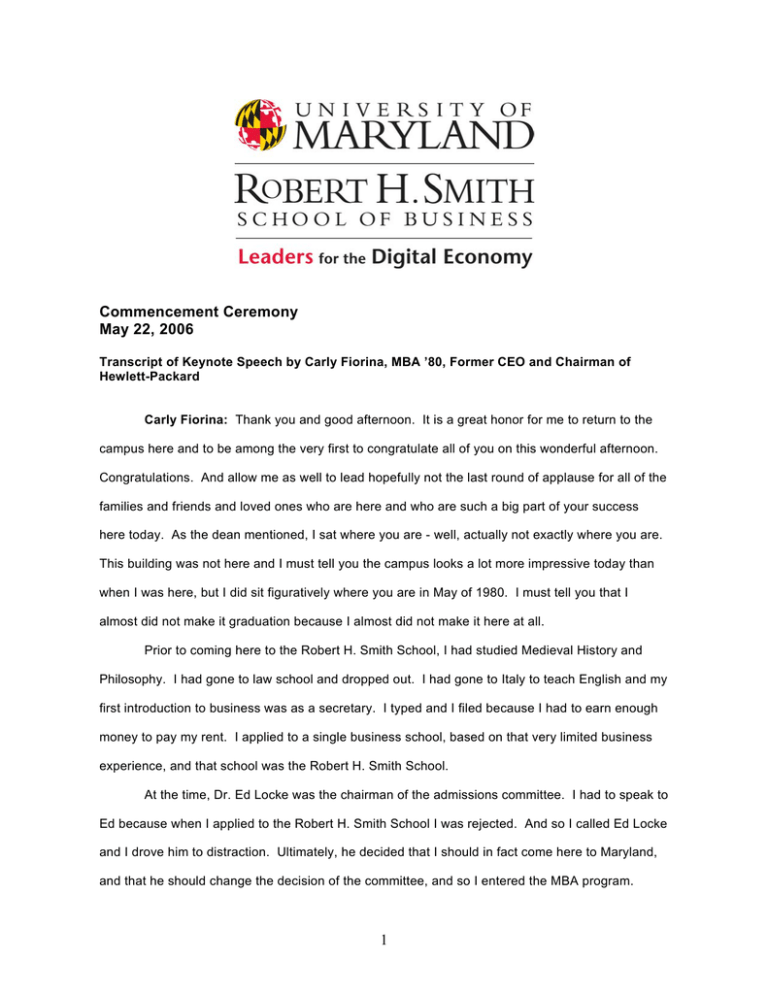
Commencement Ceremony May 22, 2006 Transcript of Keynote Speech by Carly Fiorina, MBA ’80, Former CEO and Chairman of Hewlett-Packard Carly Fiorina: Thank you and good afternoon. It is a great honor for me to return to the campus here and to be among the very first to congratulate all of you on this wonderful afternoon. Congratulations. And allow me as well to lead hopefully not the last round of applause for all of the families and friends and loved ones who are here and who are such a big part of your success here today. As the dean mentioned, I sat where you are - well, actually not exactly where you are. This building was not here and I must tell you the campus looks a lot more impressive today than when I was here, but I did sit figuratively where you are in May of 1980. I must tell you that I almost did not make it graduation because I almost did not make it here at all. Prior to coming here to the Robert H. Smith School, I had studied Medieval History and Philosophy. I had gone to law school and dropped out. I had gone to Italy to teach English and my first introduction to business was as a secretary. I typed and I filed because I had to earn enough money to pay my rent. I applied to a single business school, based on that very limited business experience, and that school was the Robert H. Smith School. At the time, Dr. Ed Locke was the chairman of the admissions committee. I had to speak to Ed because when I applied to the Robert H. Smith School I was rejected. And so I called Ed Locke and I drove him to distraction. Ultimately, he decided that I should in fact come here to Maryland, and that he should change the decision of the committee, and so I entered the MBA program. 1 My professors were great and like so many here, Dr. Rudy Lamone took a chance on me and treated me like a peer. He asked me into his office one day and put me to work for him, but more importantly he took me seriously. He took a chance on me, as did Ed Locke when he reversed the decision of the committee. Dr. Locke and Dr. Lamone decided to change the order of things. And in so doing they made all the difference for me. Leadership is about making a positive difference. Leadership is about changing the order of things. And sometimes small acts of leadership are as important as large ones because like a pebble in a pond, sometimes a small thing can make big ripples. And Ed and Rudy made a very big difference for me. Twenty-six years ago when I was sitting where you are, I was setting off to work in Washington, D.C., for what was way back then known as the Bell System. Actually, I was looking more and more like what we have today. You know AT&T and all the local companies were together but back then, the Bell System was one million employees. It was a vast bureaucracy about to go through one of the most complex corporate restructurings in history, which was at that time called, divestiture. Now, when I first entered AT&T, the Bell System back then, I went into sales and I met my very first set of customers in a strip club because that is where customers met back in those days. And when I became a manager for the first time, I proudly had my first subordinates. I was introduced by my boss as, our token bimbo. Now of course, much has changed for women since then. But it is also true that for many women in minorities the experience in business is still different than it is for a man but those early difficult experiences convinced me that I should take a chance on myself, just as Rudy and Ed had taken a chance on me, and that I should be defined by my own sense of possibility not by others’ sense of limitation. Now a little more than a decade later, I would help lead another complex corporate restructuring, the divestiture of AT&T and the creation of Lucent Technologies. And six years after that, I would lead the transformation of a company that had once been called the gray lady of Silicon Valley into an $85 billion technology powerhouse that generates 11 patents a day and operates in 173 countries around the world. Now you may remember and the dean mentioned that 2 there was a small matter of a merger to go through and a proxy battle, and after successfully completing the largest integration in the history of the technology industry, I would be fired. Yes, that is the word or if you prefer, sacked. Now with all that brief history, I think it is fair to say that I have been through all kinds of changes in my personal and in my professional life. I have become perhaps something of an expert on change and I know that change agents can be heroes one minute and heretics the next. I know from personal experience that change - whether it is personal or professional - is always difficult even if it is inevitable. Existing power structures always favor the status quo because it preserves their position. And conventional wisdom favors the powerful. And I know that there is a difference between leadership and management. A manager’s job is to produce quality results within a known set of conditions and constraints. A leader’s job is to create something new. And so the essence of leadership is to master change. The essence of leadership is to make a difference, not to maintain the status quo. Margaret Thatcher once remarked that you cannot lead from the middle of a crowd. A leader’s job is to sense danger as well as opportunity ahead of others and to lead an organization to adapt and thrive. Now as graduates of a great business school, you will have many choices as you progress throughout your career. One of the choices you will have to make is whether to lead because leadership is always a choice. And in the 21st century, more is changing than ever before. I truly believe this is a century unlike any other because this is a century in which everything physical and analog will become digital, mobile, virtual, and personal. And so as you consider your own leadership choice, consider the world around you. Now because this is a business school graduation, I will tell you the parable of Kodak and Hewlett-Packard. In 1999, when I arrived at HP we saw an opportunity in digital photography. Kodak sat atop a vast and profitable business of traditional photography. Conventional photography, as you may remember, was a physical, chemical process and yes it is appropriate to use the past tense. Less than five years later, that physical process had become virtually, completely digital. It has also become mobile. The most ubiquitous phototaking device in the world today is the cell phone. 3 Now also along the way, Kodak protected its franchise for as long as it could. And when Kodak finally declared that it would enter the realm of digital photography in a big way when it was completely obvious to everyone that the old model simply would not survive. The resulting strategic about-face was applauded as necessary but was accompanied by massive write-offs and losses because the obvious move was overdue. It is still not yet clear what Kodak’s role or success will be in the new digital age. The brand survives but will the company? At HP we concluded we had to undertake a bold move to recover our rightful position as a technology leader. By the late 90s, as the Internet era dawned, we had fallen badly behind. In 1999, we were not even among the top 25 innovators in the world. We have missed nine quarters in a row in the middle of the biggest technology upturn in history. And so in 2001, we made a bold move as the technology industry experienced its worst recession in 25 years and the global economy slowed to a four-year crawl. We made that bold move before the necessity was obvious to most and the resulting merger was hugely controversial. It was completed in time, however. It was completed when we still had an opportunity to control our own destiny. And today HP is a leader in the 21st century, not a laggard. Now I say this not to justify my own tenure as CEO. I say this to illustrate something very important about the nature of change and the nature of leadership. And so because I studied medieval history and philosophy, you will forgive a quote from one of the giants of that period, Machiavelli. It was Machiavelli who once said, “There is nothing so difficult or so dangerous to undertake as to change the order of things.” The essence of leadership is to create something new to make a positive difference, to take a risk, to take a chance to undertake to change the order of things. And in this century we need more leaders than ever before. I talked about the century being unlike any other about a digital, mobile, virtual, personal century. The story of photography is a story of how a physical process and analog content can become digital and mobile and an entire industry can be transformed forever. But what about virtual? I read an interesting article in The New York Times the other day about fantasy baseball, the creation of fantasy baseball league using real players and real statistics to create a whole new set of fantasy games in cyberspace. Of course, it is very controversial 4 because the real baseball league thinks that somehow the physical game ought to be more interesting and certainly more lucrative. But whether it is fantasy baseball leagues, or it is whole fantasy community is now, where people play games and create personas, and if you really want to make your hair hurt, transfer real money into cyber banking accounts so they can buy things in cyberspace, we are now entering an era where virtual reality truly can compete with physical reality in terms of its excitement and its interest and potentially its profitability for consumers - digital, mobile, virtual and of course, personal. The cautionary tale of the music industry is now well known. It is a tale of what happens when ordinary consumers, empowered by technology, take matters into their own hands. Consumers decided that they wanted access to music faster, more conveniently, and more cheaply than the established players were willing to provide it. And so consumers made it happen. And an entire industry has been upended. Clearly, there are now devices, which will over time become even more ubiquitous and affordable, on which vast amounts of information can be accessed and stored. There are people today working to create the digital library of all of the creativity and knowledge of humankind. What happens when the entire inventory of human experience, all 32 million books, 750 million articles and essays, 25 million songs, 500 million images, 500,000 movies, 3 million videos, TV shows and short films, and 100 billion public web pages, what happens when all that can sit in a device the size of an iPod and be networked anywhere in the world? The transformation of physical and analog to digital, mobile, virtual and personal is inevitable and inexorable. Why? Because the relentless advance of technology cannot be stopped, but also because of human behavior. Every individual, whether they are in College Park, Maryland or Bangladesh or Beijing seeks to better their own life and the life of their family. Every individual seeks out those tools that give them more control over their own lives, more of the better things in life, whatever they perceive those things to be - faster and cheaper. And the combination of a world where everything physical can be represented in digital form, where everything can be moved and networked anytime, anywhere, a world where virtual reality can be as compelling as physical reality, and a world characterized by an exploding plethora 5 of digital devices that truly enable anyone, anywhere to gain access to anything. This is a century where the individual has more power to change the course of their own life and indeed the course of the world than ever before. Everything I know after 25 years in business and technology, everything I know about business and technology tells me that business models that resist technology will ultimately fail, and that business models that try to resist the individual human beings desire for more power and control over their own lives ultimately fail as well. And everything I know after 25 years tells me that those who do not seek to master change become eventually swallowed by it. The power of the institution is changing. Think about the political impact of unknown bloggers in their pajamas and in their basements. In this digital, virtual, mobile, personal world, the old foundations of power are slowly, sometimes imperceptibly but nevertheless inexorably crumbling. Information is power, less and less. Time, distance, geography matter less. The control and protection of physical assets is less important than the harnessing of human ideas and human collaboration. This is a century that will be defined by mental power. Wealth and privilege over time will become less important than the ability to harness those ideas and to harness change. There is, of course, another trend that is changing our world forever and that is globalization. In the last 15 years as we know, three-and-a-half billion people have been added to the world’s economy. We have about 15 years of experience with the truly global economy, which is not much in the history of humankind. A few years ago when I was addressing a group of students much like this one, and at the end of my remarks, I took questions. One young woman asked how I balanced work and family. Another student asked if I had ever considered starting my own business and what I would advise. Another said that they did not much like what they were studying, had heard that I dropped out of law school and perhaps I could give him some advise as to what he should say to his parents. When everyone laughed I said, “So, in other words you want to go home and say that Carly Fiorina said it was okay to quit your major.” 6 Now nothing about the story is particularly remarkable except perhaps one thing. The university was Xinghua, and the city was Beijing. Every question was asked in perfect English, and I received beautiful thank you letters when I returned home to California from students like Mei Hong Ming, Jiao Zhen Ji, and Tracy Gao. People everywhere will use whatever tools technology affords them to better their lives and the lives of their families. This is as old as human history itself, which leads me back to you. What does leadership look like in this new century? If you choose to lead rather than simply to manage, what does that mean? And here is the irony: As much as has changed in the world, some things stay the same. I believe the essence of leadership is still the same and will always be. Leaders are candid and courageous. While they are pragmatic and flexible, they do not sacrifice their integrity or their principles. Leaders know that values matter and character counts. Leaders know their strengths and use them. They also never stop learning and adapting. They know their weaknesses and bolster them by relying on others with complimentary skills and by recognizing diversity as a business tool. They seek to surround themselves with those that are different from themselves, not those that are the same because they know in that difference a richer answer will yield. They know when they need help and seek it. They know when others need help and provide it. Leaders know that all great achievements require a team. Leaders know that successful change comes not from the heroics of a few but from effective collaboration of the many. Leadership is always about character and capability and collaboration. I believe this is a century where more things are more possible for more people in more places than ever before in human history. I believe anyone can choose to lead. And if leadership is about making a positive difference, then we have more potential leaders than ever before. And yet the dangers of this century are obvious as well and it is why leadership is so important. We have seen with horror the ways the digital, mobile, virtual, and personal age can be used for destructive purposes, whether it 7 is luring children into cyberspace to corrupt them or organizing youth to use them as human weapons. Will the United States continue to lead the world in innovation and education? If not, our economic leadership will inevitably be diminished and because political power is based on economic power, we should view an investment in innovation and education an investment in mental power as fundamental to our nation’s security and future. To change the order of things is difficult and dangerous. To master change rather than be carried along with the tide of change takes courage, and so many walk away from leadership because they are afraid. When I left this campus and went to my very first real job at the Bell System, I was sent off to nine weeks of sales and product training. I sat in a classroom with other brand-new recruits and for a while was a lot of fun to be with colleagues. It felt a lot like school. But after a few weeks it was time to put the books aside and actually start performing. Back then, we were learning something called the seven-step selling process. It was easy to study, but soon we were involved in competitive role-playing exercises, where instructors played the part of customers, and we had to develop complicated proposals and sell them, it began to get pretty tough. I have never experienced role-playing before. And I never sold anything. And I learned that actual selling as opposed to reading or talking about it was a lot harder than I realized. Now I am deeply impressed with both of our student speakers. But it is true that I did graduate from the Robert H. Smith School with a perfect straight-A grade point average. But nevertheless, despite that, I almost did not make it past this very first role-play. It involved having to convince a gatekeeper who was a perspective client secretary, as played by an instructor. You had to convince this gatekeeper that what you had to say to this client was so important that they had to let you through to speak to the client on the phone. I was put in a windowless conference room with a telephone. This was a simple exercise but despite my straight-A average, I was literally paralyzed with fear. I remember sitting in that room staring at that phone, trying to gather my courage to dial the number. Maybe you have never been afraid but I was sure I would make a fool of myself and fail 8 this first test. I told the instructor several times I was not ready, that I had to postpone the role playing. I was afraid to fail and so I was afraid to try. Eventually, I had no option. I think that first sales call was pretty pathetic. I think the instructor out of pity let me through the dreaded gatekeeper but I felt tremendous relief and triumph because I had mastered fear and moved forward. Now over the years I came to recognize the same pattern in others. I learned that I was not the only person who was afraid. And like me, during that role-play, when confronted by something new and unfamiliar, even something relatively simply, people often become immovable because of their fears. Sometimes people are so afraid to try something new. We are so afraid to fail that we cannot try at all. Some would say a manager’s job is to use fear to motivate. I believe the leader’s job is to help others overcome fear. I believe the essence of leadership is to help others achieve more than they think is possible. After a few years at the Bell System I was asked to return to the campus here. It was my first trip back as an alum, and I spoke to some MBA students. And then I quoted another philosopher, this one from even longer ago, Sun Tzu, who said, “The good leader is he who men revere. The evil leader is he who men despise. The great leader is he of whom the people say, “We did it ourselves.”” A leader’s job is to build the confidence and capability to chart a new course, to change the order of things. I wish you a life that makes you happy and proud because at the end of it all, how you measure your own life matters more than anything else. I wish you fortitude during the tough times. And peace when you come out on the other side. Have the courage to lead and the humility to recognize that nothing truly worthwhile can be done alone. I wish you all of this but for now, for today, I wish you simply a wonderful afternoon and an opportunity to savor and celebrate the moment. Video, photos and highlights are available online at: http://www.rhsmith.umd.edu/news/stories/2006/graduation.html Also, check iTunes for a podcast excerpt of this speech. Search for “Smith Business Intelligence On Demand” and subscribe to get weekly video and audio clips on timely business topics. 9
